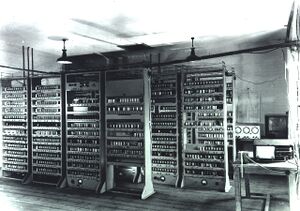Electronic delay storage automatic calculator (nonfiction): Difference between revisions
(Created page with "thumb|EDSAC 1, June 1948.'''Electronic delay storage automatic calculator''' ('''EDSAC''') was an early British computer. Inspired by John von Neumann (n...") |
No edit summary |
||
| Line 1: | Line 1: | ||
[[File:EDSAC.jpg|thumb|EDSAC 1, June 1948.]]'''Electronic delay storage automatic calculator''' ('''EDSAC''') was an early British computer. | [[File:EDSAC.jpg|thumb|EDSAC 1, June 1948.]]'''Electronic delay storage automatic calculator''' ('''EDSAC''') was an early British computer. | ||
Inspired by [[John von Neumann (nonfiction)|John von Neumann]]'s seminal First Draft of a Report on the EDVAC, the machine was constructed by Maurice Wilkes and his team at the University of Cambridge Mathematical Laboratory in England. EDSAC was the second electronic digital stored-program computer to go into regular service. | Inspired by [[John von Neumann (nonfiction)|John von Neumann]]'s seminal ''First Draft of a Report on the EDVAC'', the machine was constructed by Maurice Wilkes and his team at the University of Cambridge Mathematical Laboratory in England. EDSAC was the second electronic digital stored-program computer to go into regular service. | ||
Later the project was supported by J. Lyons & Co. Ltd., a British firm, who were rewarded with the first commercially applied computer, LEO I, based on the EDSAC design. | Later the project was supported by J. Lyons & Co. Ltd., a British firm, who were rewarded with the first commercially applied computer, LEO I, based on the EDSAC design. | ||
Latest revision as of 15:30, 17 April 2017
Electronic delay storage automatic calculator (EDSAC) was an early British computer.
Inspired by John von Neumann's seminal First Draft of a Report on the EDVAC, the machine was constructed by Maurice Wilkes and his team at the University of Cambridge Mathematical Laboratory in England. EDSAC was the second electronic digital stored-program computer to go into regular service.
Later the project was supported by J. Lyons & Co. Ltd., a British firm, who were rewarded with the first commercially applied computer, LEO I, based on the EDSAC design.
Work on EDSAC started during 1947, and it ran its first programs on 6 May 1949, when it calculated a table of squares and a list of prime numbers.
EDSAC 1 was finally shut down on 11 July 1958, having been superseded by EDSAC 2, which remained in use until 1965.
In the News
Fiction cross-reference
Nonfiction cross-reference
External links:
- Electronic delay storage automatic calculator @ Wikipedia
